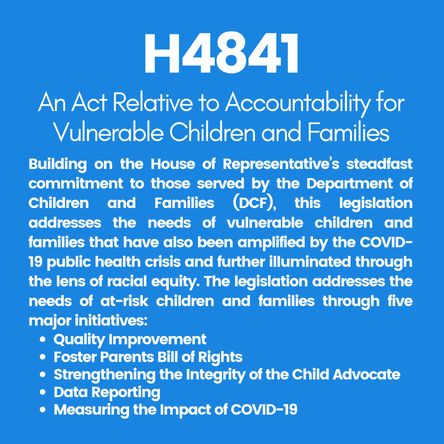 FOR IMMEDIATE RELEASE July 10, 2020 Natalie Higgins, [email protected], 978-227-5278 HOUSE OF REPRESENTATIVES BOLSTERS COMMITMENT TO CHILDREN AND FAMILIES Legislation targets accountability and analysis amidst COVID-19 and racial equity crises BOSTON – Representative Natalie Higgins (D-Leominster) joined her colleagues in the Massachusetts House of Representatives in passing An Act relative to accountability for vulnerable children and families, which strengthens the laws ensuring the safety and well-being of the Commonwealth’s youngest and most at-risk residents. Building on the House of Representatives’s steadfast commitment to those served by the Department of Children and Families (DCF), this legislation addresses the needs of vulnerable children and families that have also been amplified by the COVID-19 public health crisis and further illuminated through the lens of racial equity. Specifically, this legislation strengthens DCF policies and operations, develops a tool to retain and recruit foster families, holds DCF accountable for timely, accurate and relevant reports, and clarifies communication by the Child Advocate to the Legislature and state officeholders. The legislation compels data to analyze the impacts of remote learning on all children during the COVID-19 crisis with a focus on understanding the disparate educational impacts on children served by DCF. Additionally, the bill calls for a public service campaign to increase awareness of child abuse and neglect. The legislation addresses the needs of at-risk children and families through five major initiatives: Measuring the Impact of COVID-19. The public health pandemic has exacerbated concerns regarding all children across the Commonwealth, particularly those served by DCF. Since the declaration of the state of emergency on March 10th, reports of abuse and neglect have alarmingly decreased 51%, while home removals have dropped 60% over the same period of time. In order to best understand the effects of the state of emergency related to COVID-19, this legislation requires DCF to report on various aspects of the child welfare and education system during the state of emergency. Specifically, the bill requires:
Quality Improvement. The House of Representatives remains committed to ensuring accountability related to critical incidents that result in a fatality or near fatality, while also reviewing those critical incidents that are highlighted by systemic weaknesses. This bill installs certain safeguards, including requirements for DCF to review the case transfer policy to improve protocols for complex cases, and create a managerial review in reunification decisions. It also requires social services programs to communicate more promptly with social workers conducting client and collateral checks. Foster Parents’ Bill of Rights. Concerns of uncertainty regarding the rights of foster parents and the responsibilities of DCF related to training and processes have been intensified by COVID-19. This bill requires DCF to create a Foster Parents’ Bill of Rights outlining the relationship between the department and foster parents. A clear articulation of the rights of foster parents and the responsibilities of DCF will increase confidence and trust and is designed to retain and recruit foster families. Strengthening the Integrity of the Office of the Child Advocate. The Office of the Child Advocate is statutorily required to ensure the highest quality of services and supports are provided to safeguard the health, safety, and well-being of all children receiving services across the Commonwealth. This bill requires the Child Advocate to report any findings of critical incident reports that result in the death of a child due to a reasonable belief that a state agency failed in its duty to protect a child, jointly and simultaneously, to the governor, attorney general, speaker of the house, and senate president before the agency in question. Data Reporting Initiative. In response to serious events and concerns about children in DCF care, the Legislature has historically directed DCF to complete various reporting requirements; however, the agency has been unable to fulfill its statutory requirements to complete all reports. This bill updates and streamlines DCF reporting requirements to ensure the delivery of timely and relevant data in both a comprehensive annual report and robust quarterly reports. In addition, DCF is required to detail actions it has taken to provide culturally competent services to children and families and report on transition planning, fair hearings, reports made to the Ombudsman, and a detailed accounting of services provided through contracted agencies. The bill now moves to the Senate. ###
0 Comments
 Legislature Passes Bill Authorizing $200 Million for Municipal Road and Bridge Maintenance (BOSTON) – Last week, Representative Natalie Higgins (D-Leominster) joined her colleagues in the Massachusetts Legislature in passing legislation last week to provide $200 Million in funding for local road and bridge repairs across the Commonwealth. Amid a difficult fiscal climate, the bill maintains Chapter 90 funding at a $200 Million level for key repairs for the maintenance and upkeep of municipal roads and bridges in Massachusetts. It also extends the term of the MBTA Fiscal and Management Control Board, which was set to expire on June 30, 2020, for one additional year. “These Chapter 90 funds will not only support road and bridge repair projects, which strengthen our transportation infrastructure, but keep work going, which helps the economy,” said House Speaker Robert A. DeLeo (D – Winthrop). “I’m grateful to Chairs Straus and Michlewitz, Senate President Spilka, and my colleagues in the Legislature for their work on this bill.” “Chapter 90 funding is critical to the road repair needs of our towns and cities, and I am pleased this program could at least be level funded at $200 million by the House and Senate during today's difficult financial circumstances,” said Representative William Straus (D-Mattapoisett), Co-Chair of the Joint Committee on Transportation. “The economic fallout from the COVID-19 global pandemic has created a significant financial strain on municipal budgets across Massachusetts,” said House Minority Leader Bradley H. Jones, Jr. (R-North Reading). “By authorizing a new round of Chapter 90 funding, the Legislature is fulfilling its ongoing commitment to maintaining strong state-municipal partnerships by providing our communities with the resources needed to carry out important transportation upgrades.” “FY21 will bring more than $1.1M in vital funding for transportation infrastructure in Leominster,” said Rep. Natalie Higgins. “I look forward to continuing to work with my colleagues to find additional funding for these important investments in our communities.” The bill has been signed into law. ### BOSTON – Representative Natalie Higgins (D-Leominster) joined her colleagues in the Massachusetts Legislature last week to pass a bill that expands voter access and ensures voters have safe voting options for all remaining 2020 elections, including the September 1, 2020 state primary and November 3, 2020 general election, in response to the ongoing COVID-19 pandemic. An Act relative to voting options in response to COVID-19 was subsequently signed by Governor Baker.
The legislation, for the first time in state history, would establish a vote-by-mail option and early voting period for the upcoming fall elections. In addition to those options, the bill also addresses polling place safety for those who choose to cast their ballots in person. The components of the bill are as follows: Implements an early vote-by-mail system: An application to receive an early voting ballot for the primary will be mailed to all registered voters by July 15, 2020. The Secretary will then mail another application for the general election by September 14, 2020. Both applications and ballots will have postage costs already paid for. Ballots postmarked on or before November 3, 2020 will be counted until Friday November 6, 2020 at 5:00 P.M. Applications for early voting and absentee voting must be received 4 business days before the election, by Wednesday August 26, 2020 (for the primary election) and Wednesday October 28, 2020 (for the general election). Creates early voting for the primary and expands early voting periods: For the first time in Massachusetts, early voting will be available for the state primary, and will take place from Saturday, August 22, 2020 through Friday, August 28, 2020. Early voting for the general election is scheduled to take place from Tuesday, October 17, 2020 to Friday, October 30, 2020. Makes in-person voting safer and more efficient: The bill allows municipalities, with proper notice, to consolidate polling places and eliminate the check-out table at these locations, allowing for a more efficient process and fewer poll workers. It also expands who is eligible to serve as a poll worker, knowing that many current volunteers are seniors who may feel less comfortable working in public during COVID-19. Provides tools to assist clerks: Acknowledging the increased burden these options may place on municipalities and clerks, the bill also provides for several accommodations to make the logistics of processing votes easier. The legislation allows for tabulating ballots prior to election day, and it offers pre-addressed envelopes to voters, so their applications go directly to their clerk’s office. Tasks the Secretary of State with creating an online portal and promoting voting options: To make it as easy as possible for people to apply for general election early voting, the bill requires Secretary Galvin’s office to create an online portal not later than October 1, 2020. Electronic applications for early voting will be available for the general election, and if feasible, for the primary election. The bill also requires the Secretary of State to conduct a public awareness campaign to inform and notify voters of the many options available to cast a vote in upcoming 2020 elections. ### |
Archives
December 2021
Categories |






 RSS Feed
RSS Feed